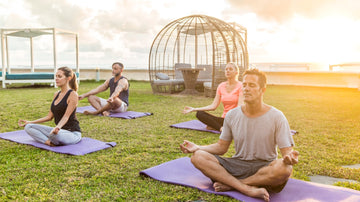How Spending Time Outdoors Can Improve Your Mental Health
by Emily Jannet on Apr 01, 2023
Mental health is a crucial aspect of overall well-being, and it has become a growing concern in recent years. With an increasing number of people experiencing anxiety, depression, and other mental health issues, it's essential to find ways to cope with these challenges. One way to promote better mental health is by spending time outdoors. In this blog post, we'll explore the benefits of the outdoors for mental health and provide tips for incorporating outdoor activities into your self-care routine.
Nature and Mental Health
Research has shown that spending time in nature can have a positive impact on mental health. In fact, a study published in the Journal of Environmental Psychology found that spending just 20 minutes in nature can reduce cortisol, the hormone associated with stress. Another study published in the International Journal of Environmental Research and Public Health found that people who spent more time in nature reported better mental health outcomes.
One reason nature may be beneficial for mental health is that it provides a break from the stresses of daily life. When we're surrounded by technology, work, and other responsibilities, it can be difficult to disconnect and relax. Nature offers a peaceful and calming environment that allows us to unwind and destress.
The outdoors can also provide a sense of purpose and accomplishment. Activities like hiking, camping, and rock climbing require physical and mental endurance, which can boost confidence and self-esteem. These activities also offer a sense of achievement, as you work toward reaching your goals and overcoming challenges.
Incorporating Outdoor Activities into Your Self-Care Routine
If you're looking to improve your mental health, incorporating outdoor activities into your self-care routine can be a great place to start. Here are some tips for getting started:
Start Small
If you're new to outdoor activities, it's essential to start small and work your way up. Begin with short walks in your local park or nature trail. As you become more comfortable, you can gradually increase the length and difficulty of your outdoor activities.
Find What You Enjoy
The outdoors offers a wide variety of activities, from hiking and camping to fishing and birdwatching. Find activities that you enjoy and that bring you a sense of fulfillment. Trying new activities can also be a great way to challenge yourself and discover new interests.

Set Goals
Setting goals can be a powerful way to motivate yourself and stay on track with your outdoor activities. Start by setting realistic and achievable goals, such as hiking a certain distance or trying a new outdoor activity. As you achieve these goals, set new ones that challenge you and help you grow.
Make it Social
Spending time outdoors can also be a great opportunity to connect with others. Consider joining an outdoor club or group in your community or inviting friends or family to join you on your outdoor adventures. Socializing and connecting with others can help improve your mood and reduce feelings of isolation or loneliness.
Be Mindful
Practicing mindfulness while engaging in outdoor activities can help you fully immerse yourself in the experience and reduce stress and anxiety. Focus on your senses, such as the sound of birds chirping or the feel of the sun on your skin. Practice deep breathing and let go of any negative thoughts or distractions.
In a Nutshell
Incorporating outdoor activities into your self-care routine can be a powerful way to improve your mental health and overall well-being. Nature offers a calming and peaceful environment that can help reduce stress and anxiety and boost self-esteem and confidence. By starting small, finding activities you enjoy, setting goals, making it social, and practicing mindfulness, you can create a sustainable outdoor self-care routine that supports your mental health.
In addition to the benefits mentioned, spending time outdoors can also have a positive impact on physical health. Outdoor activities like hiking, walking, and gardening can help increase physical activity levels, which can improve cardiovascular health, strengthen muscles and bones, and lower the risk of chronic diseases like obesity and type 2 diabetes. Being in nature can also help improve sleep quality, which is important for overall health and well-being.
It's important to note that while spending time outdoors can be beneficial for mental health, it's not a substitute for professional mental health treatment. If you're struggling with mental health issues, it's important to seek help from a mental health professional.





